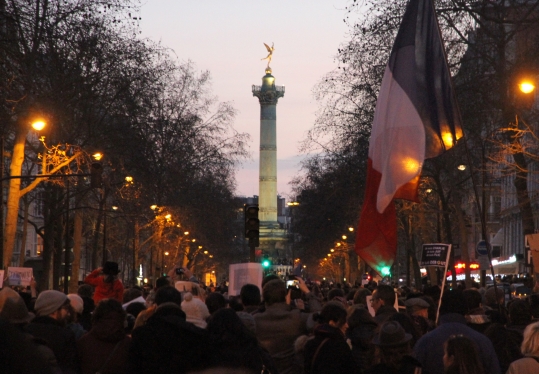Interview with Paul Rogers on Paris attack
Paul Rogers, professor of peace studies at the University of Bradford and OpenDemocracy’s international-security editor, discussed the recent attacks in Paris and the war against ISIS in Iraq and Syria on CBC’s The Sunday Edition with Michael Enright on January 11th.
On the motivations of the Paris attackers, and Islamist extremists in general, Rogers argued,
To understand where they are coming from, broadly and even particularly in the case of this terrible attack, I think is necessary, otherwise we face the fact of this conflict going on for another 15, 20, or more years. …
If you look at it from the position of the leaders of Islamic State in Syria and Iraq and if you look at it from the point of view of the extreme propagandists then they actually want this.
They want the backlash; this is something one has to understand if you look at the way the Islamic State performed those appalling beheadings, frequently using someone with a British accent to narrate these atrocities. …
The people who are saying we must see this as an assault on our freedom, that these are the radicals in our midst and we must basically label all Muslims as a threat, this is playing directly into the hands of the extremists.
In reference to the war against ISIS in Iraq and Syria, Rogers said,
It is worth saying that this is a major war. It’s astonishing how little it is being reported in the West. Over the last five months of the air war we’ve had something like 3200 airstrikes on well over 2000 targets. …
People don’t perhaps appreciate there is a full-scale war in which the West is involved, and France is probably the most significant country after the United States, although of course Canada has its CF-18s, Australia, Britain, and all the rest.
While discussing the consequences of the Paris attack, Rogers said,
It has been extraordinary over the last 3-4 days to see how the French have found it absolutely necessary to commit many tens of thousands of troops, security forces, and the rest to try to control what was essentially just three people. …
If you’re bringing in these kinds of controls in response for this particular threat they can be applied in other political circumstances, on other occasions in different ways. I think this is in some ways the longer term and maybe more insidious threat. …
Unless we can see this also in the much wider perspective of what is happening in the Middle East, it’s going to be more difficult to actually get to grips with it fully.
Listen to the full interview here: Paul Rogers on Paris attack
Photo credit: Maya-Anaïs Yataghène, Flickr
